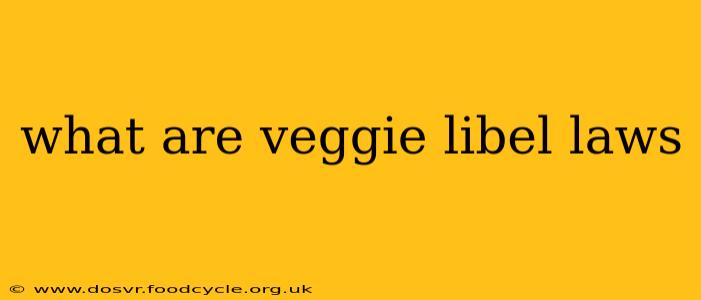What Are Veggie Libel Laws?
Veggie libel laws, also known as agricultural disparagement laws, are legal statutes that protect the agricultural industry from false or misleading statements that damage the reputation or market value of a particular agricultural product. These laws are designed to shield farmers and producers from unfair criticism that could significantly harm their businesses. Essentially, they allow agricultural producers to sue individuals or organizations for defamation if they can prove that false statements harmed their sales or reputation.
Unlike general defamation laws, veggie libel laws often have specific requirements that must be met before a lawsuit can be successful. This is because proving harm to an entire agricultural sector can be challenging.
What Makes a Veggie Libel Case?
Several key elements typically need to be proven in a veggie libel case:
- False statement: The statement made must be demonstrably false. This requires evidence that contradicts the claims made. Simple disagreement or negative opinions are generally not sufficient.
- Publication: The false statement must have been published or disseminated to a third party. This means it must have been communicated to someone other than the target of the statement.
- Malice: This is a crucial element. The plaintiff (the agricultural producer) must typically demonstrate that the defendant (the person or organization making the statement) knew the statement was false or acted with reckless disregard for the truth. This is a higher burden of proof than in standard defamation cases.
- Damages: The plaintiff must prove they suffered economic harm as a direct result of the false statement. This might involve demonstrating a loss of sales, decreased market share, or other financial losses attributable to the statement.
Are Veggie Libel Laws Effective?
The effectiveness of veggie libel laws is a subject of ongoing debate. Proponents argue they protect farmers from unfair attacks that can decimate their livelihoods and undermine consumer confidence. Opponents contend that these laws stifle free speech and make it difficult to criticize potentially harmful agricultural practices. They also argue that the high burden of proof makes it difficult for plaintiffs to win cases, leading to costly and time-consuming litigation.
Furthermore, the application of these laws varies significantly across jurisdictions. Some states have stronger veggie libel laws than others, and the legal interpretation of these laws can differ considerably.
What are some examples of cases involving veggie libel laws?
While many cases are settled out of court, some notable examples have involved disputes over the safety and health effects of specific agricultural products. These cases often highlight the complexities and challenges in proving malice and economic harm.
How do veggie libel laws differ from other defamation laws?
The key difference lies in the focus and the higher burden of proof. While standard defamation laws protect reputation generally, veggie libel laws specifically target false statements about agricultural products that cause demonstrable economic harm. The malice requirement is generally stricter in veggie libel cases than in standard defamation cases.
What are the arguments for and against veggie libel laws?
Arguments for:
- Protect farmers' livelihoods from unfair and potentially devastating accusations.
- Maintain consumer confidence in the safety and quality of agricultural products.
- Deter the spread of misinformation that can harm the agricultural industry.
Arguments against:
- Restrict free speech and the ability to criticize agricultural practices.
- Can be costly and time-consuming to litigate.
- The high burden of proof makes successful prosecution difficult.
The debate surrounding veggie libel laws continues, highlighting the inherent tension between protecting industries and safeguarding freedom of speech. Understanding the complexities of these laws requires careful consideration of both the economic and social implications.
